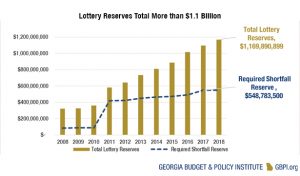Governor Brian Kemp’s proposed 2020 budget includes an additional $47.7 million in lottery funds, bringing the total for Georgia’s lottery-funded pre-Kindergarten and HOPE financial aid programs to $1.25 billion. About $870 million is for HOPE and $379 million is for pre-K. The biggest changes to HOPE in the governor’s budget are a 3 percent award increase and a $42 million transfer of funds from HOPE Grants for technical college certificates or diplomas to HOPE Scholarships for bachelors and associate degrees. The budget allots an additional $16 million in lottery funds for a $3,000 pay raise for certified pre-K teachers and a 2 percent pay bump for assistant pre-K teachers.
By the Numbers
Amended 2019 Fiscal Year Budget
- Adds $2.9 million to the Georgia Student Finance Commission to meet the need for HOPE and Zell Miller Scholarships in private colleges
2020 Fiscal Year Budget
Proposed spending for the six HOPE programs grows $36 million to total $870 million, a 4 percent increase from last year. This includes a 3 percent award increase for HOPE Grants and Scholarships and a $500 increase in Zell Miller Scholarships at private colleges. Most of the 2020 budget increase is to meet projected need.
For pre-K, the net lottery funds increase is $11 million. Major additions to lottery-funded programs include:
- $16.5 million for a pay raise for pre-K teachers and assistant teachers
- $78 million for HOPE Scholarships, which provides tuition awards for bachelors and associates degree students. This includes a $42 million transfer from HOPE Grants, which provide tuition awards for technical college certificate/diploma students. After the transfer, HOPE Grant funding now stands at $67 million.
Even with the transfer from HOPE Grants, the budget includes a 3 percent award increase from existing funds. HOPE Grant funding had been flat for several years while total award expenditures were falling. The 3 percent award boost can be expected to cover inflation or a tuition increase, which remained flat for the 2018-2019 academic year.
The Georgia Student Finance Commission also administers the lottery-funded low-interest loan program. These loans remain flat in the 2020 budget at $26 million budget.
Pre-Kindergarten
The governor’s proposed budget includes $15 million in additional lottery funding to raise lead pre-K teacher’s pay by $3,000 annually. This amount will pay for the increases of just over 4,100 lead teachers and certified employees across the state. $1.5 million was allotted to provide for a two percent raise for assistant teachers. At a pay level of $15,900, this raise would represent $318 per year.[i]
Even with the increase of funds for Georgia’s pre-K program, the state continues to exceed national standards for class size. Former Gov. Deal’s Education Reform Commission recommended class sizes be lowered to a ratio of 10 students for every teacher. Currently, Georgia’s maximum class size is 22 and its student teacher ratio is 11-to-1.[2] For the state’s program to continue to be recognized as a national model, additional teachers would need to be hired to oversee smaller classes.
HOPE Financial Aid Programs
HOPE is comprised of several different programs: HOPE and Zell Miller Scholarships, HOPE and Zell Miller Grants, HOPE Career Grants and HOPE GED Grants.
The HOPE Scholarship is for students seeking associates or bachelor’s degrees. The scholarship covers partial tuition for students with a 3.0 GPA. The Zell Miller Scholarship covers full tuition for students with a 3.7 high school GPA who score at least 1200 on the SAT or 26 on the ACT and take four rigorous courses (e.g. Advanced Placement). Students must maintain a 3.3 cumulative college GPA to keep the award.
HOPE and Zell Miller Grants are for technical college students in certificate or diploma programs. The HOPE Grant covers partial tuition and the Zell Miller Grant covers full tuition for students with a 3.5 GPA.
The HOPE Career Grant is the newest HOPE program. The career grant is coupled with the HOPE or Zell Miller Grant for students enrolled in certain certificate and diploma program areas identified as strategically important to the state’s economic growth. The most popular HOPE Career Grant programs include practical nursing, health science, early childhood education and welding.
Lottery Reserves
Surplus lottery funds transfer to lottery reserves held by the State Treasury. At the end of budget year 2018, $78 million in lottery dollars went unspent. Total lottery reserves are now more than $1.1 billion. Georgia law requires about half of these funds, $550 million, in case of a shortfall.
[1] Based on a GBPI calculation of the 2018-2019 Georgia’s Pre-K Rate/Per Child Estimate Chart. Retrieved from: http://decal.ga.gov/documents/attachments/2018-2019%20RateChart.pdf
[2] Bluestein, G. (2015). Governor plans to pump $50 million into Georgia’s pre-k programs. Retrieved from: https://www.ajc.com/news/state–regional-govt–politics/governor-plans-pump-million-into-georgia-pre-programs/HzFpHEgYnyj1ElnsS8S0yJ/







